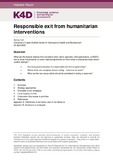| dc.contributor.author | Tull, Kerina | |
| dc.date.accessioned | 2020-05-14T10:05:31Z | |
| dc.date.available | 2020-05-14T10:05:31Z | |
| dc.date.issued | 2020-04-20 | |
| dc.identifier.citation | Tull, K. (2020). Responsible exit from humanitarian interventions. K4D Helpdesk Report 791. Brighton, UK: Institute of Development Studies. | en |
| dc.identifier.uri | https://opendocs.ids.ac.uk/opendocs/handle/20.500.12413/15307 | |
| dc.description.abstract | This helpdesk report examines the responsible exit of donor agencies, UN organisations, or NGOs from humanitarian interventions. It highlights the key lessons learned from examples of exits. Three exit processes have been identified by a multi-donor evaluation for different contexts and reflecting different management challenges: exit from force majeure situations, exit from aid-dependent countries and aid transformation in graduating countries. Three broad approaches of exit processes undertaken by international non-government organisations (INGOs) are the Full Closure Model, the Localisation Model and the Devolved Programme Model. Possible transition processes are related to measurable indicators, such as phasing out food aid to a limited number of schools. Developing and using short responsible exit criteria helped in a successful exit in Moldova. Senior staff are critical points in an exit process. Operational shifts have been used successfully by the World Food Programme. Both donor and recipient capacities are important factors. Ensuring the financial sustainability of local entities is a critical part of making transitions – and ultimately locally-led development - a success. Also, attempting a hasty exit can result in financial damage to both the donor and the recipient. | en |
| dc.language.iso | en | en |
| dc.publisher | IDS | en |
| dc.relation.ispartofseries | K4D Helpdesk Report;791 | |
| dc.rights.uri | https://www.nationalarchives.gov.uk/doc/open-government-licence/version/3/ | en |
| dc.subject | Aid | en |
| dc.subject | Health | en |
| dc.subject | Rights | en |
| dc.subject | Security and Conflict | en |
| dc.title | Responsible Exit from Humanitarian Interventions | en |
| dc.type | Helpdesk | en |
| dc.rights.holder | © DFID - Crown copyright 2020 | en |
| dcterms.dateAccepted | 2020-04-20 | |
| rioxxterms.funder | Department for International Development, UK Government | en |
| rioxxterms.identifier.project | K4D | en |
| rioxxterms.version | VoR | en |
| rioxxterms.funder.project | 238a9fa4-fe4a-4380-996b-995f33607ba0 | en |

